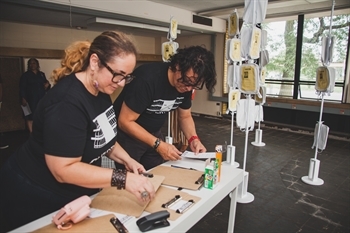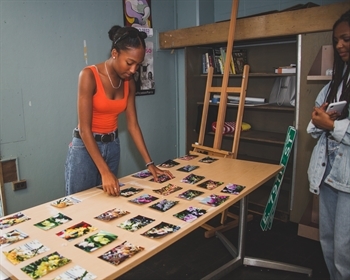Redevelopment of closed schools does not center the social value of the institutions. That's why Creative Grounds emerged as a community-led initiative to reimagine millions of square feet and hundreds of acres of vacant space.

Photo courtesy of Monica Chadha
 By Paola Aguirre, Founder of Borderless Studio, and Rae Perez, Associate at North Lawndale Employment Network
By Paola Aguirre, Founder of Borderless Studio, and Rae Perez, Associate at North Lawndale Employment Network - November 21, 2019
Since 2016, Creative Grounds has emerged as a community-led initiative to address the unprecedented closure of 50 Chicago Public Schools that left more than 3 million square feet of existing building space and hundreds of acres of outdoor space in 25 neighborhoods to be reimagined. Despite the potential for community self-determination, the repurposing process of closed schools has occurred without a broader vision, without publicly funded support, and has led to missed opportunities in imagining new ways of collective city-building rooted in values of equity, transparency, and inclusion. These public amenities are multi-dimensional assets, with invaluable physical and emotional connections to their communities and their histories. Foremost, they are public buildings built with public resources. The current redevelopment process of the standard public bid does not allow for their true social value to be at the forefront of their repurposing.
We were fortunate to find a partner who shared our vision of using the closed schools to engage in a conversation regarding redevelopment. Working with Ghian Foreman from the Washington Park Development Group, the now owner of the former Anthony Overton Elementary in Bronzeville, since 2016, Overton has become an incremental testing ground. It is a place that has been activated by community members in a variety of ways, ranging from fitness classes, basketball training for youth, to temporary art and design installations and cultural programming. This is a community centered process that could occur across all closed schools, as a prototype.

Photo courtesy of Ally Almore
Process(ing) Transformation: Exploring Collaborative Creativity focused on Memory, Inclusion and Equity
With the goal of bringing awareness about school closures, enabling inclusive and open dialogues, and sparking collective imagination about the future of social infrastructure in Chicago, Creative Grounds is prototyping a transformative process through open calls for activation projects at Overton. The framework is quite simple: how does equitable social infrastructure look like in the future for Chicagoans?
This year, Overton was featured as a curatorial venue as part of the Chicago Architecture Biennial. The 2019 Biennial, titled “…and other such stories” reflects on the way that the Chicago built environment reflects on the social, geopolitical, and ecological processes that affect our collective past, present and future. This summer’s activations focused on Process(ing) Transformation and the teams were asked to explore memory, inclusion, and equity as guiding prompts. Architects, artists, and community members were welcomed into the space to learn about the space and work on installations around the premises.
These activations are highly invested in cultivating partnerships and engaging community members in different capacities and dimensions. Chicago Arts Partnerships in Education has been an incredibly supportive partner engaging teachers and artists working in schools in proximity to Overton such as Williams Prep High School and Dyett School of the Arts, as well as BlackSpace Chicago in connecting with multiple resources and volunteers. An advisory group is also assembled every year including both city-wide and Southside community members who are fundamental in providing insights, perspective and connections related to project process and programming.

Photo courtesy of Ally Almore
Community Activation Days at Anthony Overton: Making Space Together
The three activations, occurring from June to August culminated in a Community Day that drew people from around the world and across the street. Upbeat tunes from DJ Sadie Woods and La Spacer and Ms. Lee's Good Food wafted through the hallways of the former school, bringing the building to life again for a day. Each classroom became a space for teams to reconcile with and re-imagine the imprint a school closure leaves on a place and a people. By bringing people together with different personal, academic and artistic backgrounds, the projects generated conversations and spaces that reflected the complexity of the site’s context. Some projects were focused on the school’s legacy, while others concentrated on the present urban context of Bronzeville. As with any collaborative endeavor, each person and team brought a different concern to the table, some grappling with race and equity, and others exploring environmental possibilities.
With an open invitation to engage with the space, onlookers became participants, able to both contemplate and respond to the themes of the installation. For example, the project “Schlepp” encouraged visitors to reflect on their own experiences in school. People were asked to write responses to questions like “What was your biggest challenge in elementary school?” and place their answers with a polaroid of themselves in a small backpack, which was hung on upright racks around a classroom. This kind of interactivity welcomed people to bring their own stories into the space and be a part of its making.

Photo courtesy of Ally Almore
Build Awareness. Enable Dialogue. Spark Collective Imagination + Action
Creative Grounds, has expanded to serve as a model for how design can be used to start conversations and inspire collective action. One lesson from the 2018 Activation Days was that the simplest installations were often the most effective. It didn’t take elaborate construction to convey an authentic message or invite people to consider an important question.
As the Creative Grounds project continues to evolve and learn, it has continued to host Activation Days at 4927 S. Indiana Avenue throughout this fall. During October's activation, we had the CAC Neighborhood Teens Ambassadors leading tours, and partner with the Bronzeville Bustle 5k Run/Walk/Design festival co-organized by Chicago Mobile Makers and Could be Architecture. On Saturday, November 16, the last Open House event was hosted, supported by the Chicago Architecture Biennial.
Want to learn more or get involved? Visit this website to explore installations and join our mailing list to stay up to date.
Rae Perez graduated from Princeton University’s School of Architecture in 2019, and wrote her undergraduate thesis on the architectural and urban implications of school closures in Chicago. She now does program evaluation at the North Lawndale Employment Network, helping returning citizens to find jobs. Rae is interested in leveraging design and technology as tools to approach complex social issues.
Paola Aguirre is the founder of Borderless Studio which leads Creative Grounds, an initiative that works from the perspective of racial equity and social justice, and uses civic arts, design, architecture and cultural engagement as drivers and tools for proposing a new pathway – one school at the time.